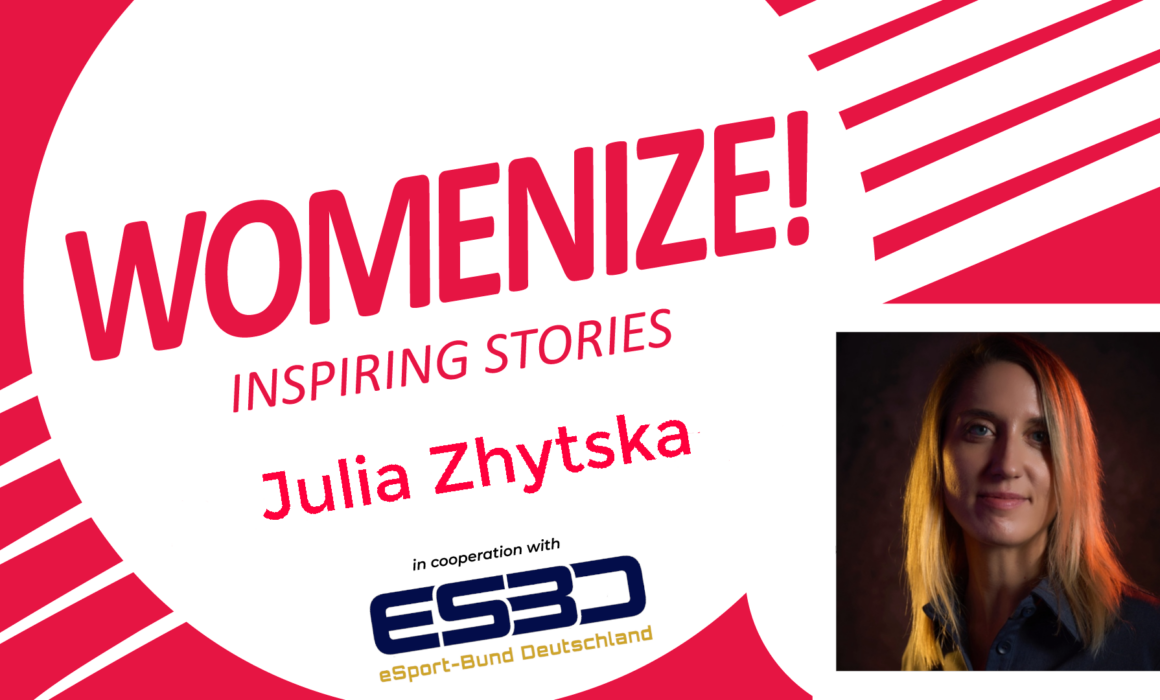Julia Zhytska – Womenize! – Inspiring Stories
Womenize! – Inspiring Stories is our weekly series featuring inspirational individuals from games and tech. For this edition, we collaborated with ESBD – eSport-Bund Deutschland e.V. and talked to Julia Zhytska, Director Social Media at ESL FACEIT Group. She speaks about empathetic leadership, the evolution of social media in esports, and balancing strategy with hands-on work during major esports events. Read more about Julia in this interview:
Hi Julia! As Director Social Media at ESL Faceit Group, what core leadership principles guide your approach? How do you foster an environment where your team stays both creatively driven and aligned with the strategic goals of the company, while meeting the high expectations of the esports community?
I am an empathetic, people-oriented leader, my team is always my priority. I focus a lot on listening and supporting the team, using my diverse experience in marketing and esports to provide strategic advice and tactical direction where needed, as well as soft leadership skills to make sure people in the team feel supported, motivated and empowered to do their best work.
On the other hand, I set a pretty high quality bar for myself and my team. I’d rather do less, but better and with more impact. At the same time, if someone makes a mistake, for me it’s a learning experience, both wins and failures help us improve and evolve together. I organise regular retrospective sessions and workshops to encourage identifying improvements and brainstorming innovative ideas.
Working in esports means always focusing on serving a passionate, but also demanding and diverse community. This can be both rewarding and challenging.
At EFG we are bringing our passion for gaming culture into the content we produce for gamers and esports fans around the world.
In my role, it’s also important to navigate a very dynamic environment where tasks and project priorities can change relatively quickly. As a manager, I focus on helping my team members adapt to change, build resilience, and find effective solutions to help us achieve our goals.
With your extensive experience across various esports organisations, how have you seen the role of social media in esports evolve over the years, and where do you think it’s heading next??
When I started my career in esports, the industry was not that big, many esports clubs and companies were startups. I remember the first esports job interview I had was in an apartment that doubled as a temporary office for the company. I like to say that I started in esports before it was cool.
Being a social media manager back then basically meant doing 4-5 jobs in one: I did everything from channel and content strategy to photographing esports players, creating basic social media assets, shooting videos, managing sponsor commitments, hiring and training new social media freelancers, and more. We never had big marketing and social media budgets back then, so everything I did was pretty much DIY or very low-cost.
I loved it all because I was able to live the dream of combining my hobby with my job. Looking back now, I have no regrets, but I do realise how hard I was working – hardly any free weekends, working until midnight almost every day, skipping vacation to travel to esports events… I think nowadays the role of the social media manager seems to be evolving overall, as more and more companies take social media more seriously and start to invest more budget and human resources.
My personal perception is that in esports specifically, social media roles are still very much undervalued, I know many people who are still working the same insane schedule with responsibilities of 5 roles combined into one. I hope that this will change in the future, as social media managers, especially in gaming and esports, have one of the most challenging jobs that deserves more recognition.
With major global events and campaigns under your leadership, how do you structure your day to balance high-level strategy with the tactical demands of social media? What does a typical day look like for you when working on large-scale esports activations?
During the so-called “offseason”, when I am not working at esports events, my day usually starts with a cup of coffee and a quick review of the previous day’s social media content – I always try to see how our posts are doing after 24 hours, read comments and check what other brands are posting. Then I usually answer my emails and Slack messages.
I work from home, so I save time on my commute, which allows me to have a cup of coffee on my couch before diving into meetings.
My calendar is usually pretty busy with online calls almost every day: I have regular meetings with the social team, cross-functional weekly meetings with broader marketing teams, broadcast, media production, product and player management. I also manage the relationship with a client on the current project I am working on, so there are also external meetings with them 1-2 times a week.
On Mondays and Tuesdays I have 1:1s with my team members and close colleagues.
At the end of the day, I try to set aside some time for focused work, which can be anything from content planning to strategy, reporting, presentations or workshops.
During the event season, we usually travel with the team to offline event locations, prepare content during media days, and do a lot of “live coverage” work on the ground. Events are usually one of the most rewarding parts of the job, as we get to soak up some of the esports atmosphere, get inspired by meeting players and fans, and also see “live” reactions to the content we put out on our channels.
Thanks for this interview, Julia!
Julia’s links: LinkedIn
Womenize! – Inspiring Stories Feature by Madeleine Egger

